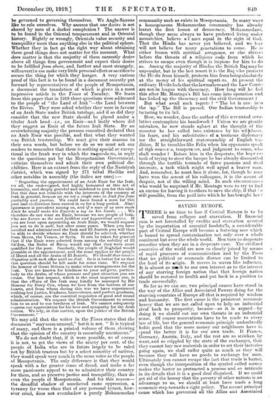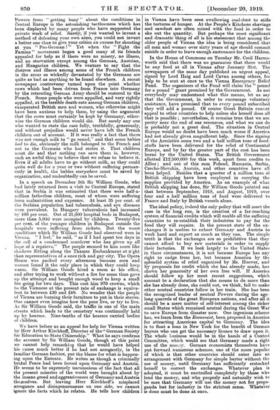SAVING EUROPE.
So far as we can see, two principal causes have stood in the way of the Allies and Associated Powers doing for the starving countries of Europe all that is required by wisdom and humanity. The first cause is the persistent economic heresy that we are not called upon to help an industrial rival back to prosperity, because—so it is argued—by doing it we should cut our own throats in an industrial sense. Of course reservations have to be made to every law of life, but the general economic principle undoubtedly holds good that the more money our neighbours have to spend the better it is for our own trade. If France, Germany, Austria, Italy, and the rest are so stricken by want, and so crippled by the state of the exchanges, that they cannot buy raw materials in order to set their factories going again, we shall suffer quite as- much as they will because they will have no goods to exchange for ours. Ultimately you cannot escape the fact that trade is barter, even though the interposition of the symbol called money makes the barter-so protracted a process and so intricate in its details that it is a good deal disguised. If we could get rid of the heresy that the poverty of other nations is an advantage to us, we should at least have made a long economic step towards a right policy. The second principal cause which has prevented all the Allies and Associated Powers from " getting busy " about the conditions in Central Europe is the astonishing tactlessness which has been displayed by many people who have supported the private work of relief. Surely, if you wanted to invent a method of defeating your own aims, you could not invent a better one than to give your critics an excuse for shouting at you " Pro-German ! Yet when the " Fight the Famine " movement began a good many of its friends appealed for help as if there were no misery, no illness, and no starvation except among the German, Austrian, and Hungarian children. We venture to say that the distress and illness among some of the French children in the areas so wickedly devastated by the Germans are quite as bad as anything to be found elsewhere. A recent newspaper controversy turned upon the point whether cows which had been driven from France into Germany by the retreating German Army should be restored to the French. Some people who were appalled, and very rightly appalled, at the terrible death-rate among German children, exasperated British men and women, who otherwise might have been anxious to help them, by using the argument that the cows must certainly be kept by Germany, other- wise the German children would die. But surely any one who wanted to state the case fully, truthfully, generously, and without prejudice would never have left the French children out of account. If it was really a fact that there was not enough milk to " go round," and that some babies had to die, obviously the milk belonged to the French and not to the Germans who had stolen it. That children must die and that nothing can save them is, however, such an awful thing to believe that we refuse to believe it. Even if all adults have to go without milk, as they could quite well do for a year or two without suffering perman- ently in health, the babies everywhere must be saved by organization, and undoubtedly can be saved.
In a speech on December 5th Sir William Goode, who had lately returned from a visit to Central Europe, stated that in Serbia it was estimated that there were half-a- million fatherless children, most of whom were suffering from malnutrition and exposure. At least 35 per cent. of the Serbian population had tuberculosis, and eye diseases were prevalent. In Hungary tuberculosis had increased by 100 per cent. Out of 21,000 hospital beds in Budapest, more than 5,000 were occupied by children. Twenty-five per cent. of the younger children in Budapest outside the hospitals were suffering from rickets. But the worst conditions which Sir William Goode had observed were in Vienna. " I feel," he said, " as if I had spent ten days in the cell of a condemned murderer who has given up all hope of a reprieve." The people seemed to him more like shadows flitting along the Thames Embankment at night than representatives of a once rich and gay city. The Opera House was packed every afternoon because men and women found it the only place in which they could keep warm. Sir William Goode hired a room as his office, and after trying to work without a fire for some time gave up the attempt and bought enough wood to keep a small fire going for two days. This cost him 970 crowns, which to the Viennese at the present rate of exchange is equiva- lent to between £30 and £40. No wonder that the people of Vienna are burning their furniture to put in their stoves. One cannot even imagine how the poor live, or try to live. As Sir William Goode said, the traffic in one of the main streets which leads to the cemetery was continually held up by hearses. Nine-tenths of the hearses carried bodies of children.
We have before us an appeal for help for Vienna written by Herr Arthur Kirchhoff, Director of the" German Society for Education to State Citizenship." What he says confirms the account by Sir William Goode, though at this point we cannot help remarking that he would have helped his cause much better if he had not arrogantly, in the familiar German fashion, put the blame for what is happen- ing upon the Entente. He writes as though a criminally brutal Peace had been forced upon Germany and Austria. He seems to be supremely unconscious of the fact that all the present miseries of the world were brought about by the insane greed and aggressiveness of Germany and Austria themselves. But leaving Herr Kirchhoff's misplaced arrogance and disingenuousness on one side, we cannot ignore the facts which he relates. He tells how children in Vienna have been seen swallowing coal-dust to stifle the tortures of hunger. At the People's Kitchens shavings and sawdust are often mixed with the food in order to eke out the quantity. But perhaps the most significant and dramatic thing of all is his statement that among the older people of Vienna the idea is being considered-that all men and women over sixty years of age should commit suicide in order to leave enough sustenance for the children.
In the House of Commons on Tuesday Mr. Cecil Harms- worth said that there was no guarantee that there would be any food at all in Vienna after January 31st. The newspapers of the same day published an urgent appeal, signed by Lord Haig and Lord Cavan among others, for help to be sent at once to the Vienna Emergency Relief Fund. The organizers of the Fund will claim the pound for a pound " grant promised by the Government. As not everybody may understand what this means, let us say that the Government, in order to encourage voluntary assistance, have promised that to every pound subscribed they will add a pound. Of course Great Britain cannot appeal to other countries to help unless she herself does all that is possible ; nevertheless, it remains true that we are pretty near the end of our resources, and what we can do is probably not a great deal. The situation in Central Europe would no doubt have been much worse if America had not already given magnificent help. Since the signing of the Armistice some two and a half million tons of food- stuffs have been delivered for the relief of Continental Europe, and by far the greater part of the cost has been borne by the United States. The British Government allotted £12,500,000-for this work, apart from credits to Allies ; and out of this sum Poland, Rumania, Serbia, Czecho-Slovakia, Austria, and other countries have all been helped. Besides that a quarter of a million tons of British shipping have been employed in carrying the supplies provided by America. As an example of what British shipping has done, Sir William Goode pointed out that between September, 1918, and August, 1919, over four and a half million tons of food were delivered to France and Italy by British vessels alone.
The ideal policy, indeed the only policy that will meet the case in the long run, is the creation of a far-reaching system of financial credits which will enable all the suffering countries to re-establish their industries to pay for the food they will require. In the present state of the ex- changes it is useless to exhort Germany and Austria to work hard and export as much as they can. The simple truth is that the exchanges are so prohibitive that they cannot afford to buy raw materials in order to supply their factories. If we look largely to the United States in these circumstances, it is not because Europe has any right to cadge from her, but because America by the splendid system of relief organized by Mr. Hoover, and by proposals for credit which she has already made, has shown her generosity of her own free will. If America should follow up her most recent suggestions, which amount to a declaration that she means to do more than she has already done, she could not, we think, fail to make other neutral countries follow in her train. She has been the recognized leader of neutral Powers during the age- long quarrels of the great European nations, and after all it should be a mere matter of self-interest among the richer small States which remained neutral during the Great War to save Europe from disaster now. One ingenious scheme has, we learn from the Economist, been proposed in America for attracting American capital to Germany. The idea is to float a loan in New York for the benefit of German buyers who can get the necessary licence to draw upon it. The whole business would be in the hands of a Control Committee, which would see that Germany made a right use of the money. German economists themselves have put forward numerous schemes, one of the more .popular of which is that other countries should enter into an arrangement with Germany for simple barter without the use of money, until Germany has sufficiently restocked herself to correct the exchanges. Whatever plan is adopted, it must be controlled completely by those who lend the money, and who properly and naturally wish to be sure that Germany will use the money not for propa- ganda but for industry in the strictest sense. Whatever is done must be done at once.







































 Previous page
Previous page